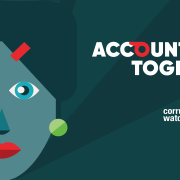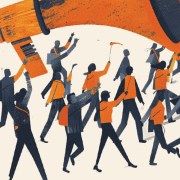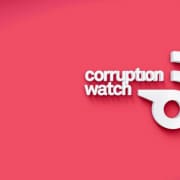|
Getting your Trinity Audio player ready...
|
The long journey of over 36 200 whistle-blowers in the fight against corruption in South Africa comes into focus in the 2021 edition of the Corruption Watch (CW) annual report, Pushing for change, as the organisation commemorates 10 years since its establishment in 2012.
The past decade reveals a volatile experience for the brave whistle-blowers who have not been deterred by intimidation, stringent lockdown conditions, or threats to their livelihoods and sometimes even their lives. As recently as 2021, the shocking news of the brutal assassination of Gauteng health department whistle-blower Babita Deokaran signalled a treacherous environment for whistle-blowers. And yet, CW witnessed the ongoing willingness of people to share their stories and experiences of corruption and expose it at all levels of society. This speaks to their commitment to be part of the solution, and to hold those responsible to account, in spite of the risks.
“We see ourselves as an activist organisation that carries the public trust, a role we are privileged to perform in the interests of the country,” says Karam Singh, executive director of CW. “We pledge to continue our work in applying pressure on decision-makers, top officials and leaders in the public and private sectors, and to honour our commitment, made all those years ago in 2012, to work towards the creation of a corruption-free South Africa. An essential part of this work is to ensure adequate protection and support for whistle-blowers, without whom we would not exist,” he adds.
The conditions during 2021 were still largely defined by the fluctuating effects of Covid-19, the state of disaster regulations restricting movement, the various waves of the pandemic impacting people’s lives, and the new ways required to engage with communities in the country.
CW defines corruption as the abuse of entrusted power for personal gain. The organisation received 3 248 corruption reports in 2021, a decline from the 4 780 in the previous year. Most of these accounts relate to allegations of maladministration (18%), followed by procurement corruption and abuse of authority (16% each). Other reports focus on fraud (14%), misappropriation of resources (12%), and dereliction of duty (8%), all of which featured prominently throughout the Covid-19 period and its various stages of lockdown.
Since its inception, CW has made it a priority to expose small-scale corruption, sometimes called petty corruption, alongside the cases of grand corruption, believing that it matters as much as the cases making headlines for its profound impact on people’s day-to-day lives. Accordingly, the organisation has placed whistle-blowers at the forefront of exposing the extent and manifestations of corruption in South Africa. It is through the decisive action of these committed people who have raised their hands that CW has been able to apply pressure on leaders and push for change. From the outset, the organisation sought to not only use this information to educate the wider public and advocate for improvements in the legislative and policy environment, but to also stand up as a voice for whistle-blowers.
What the numbers say
The breakdown of corruption reports by institution reveal that the majority identify corruption or misconduct in the public sector (67%) – of these, 28% point to national government level, 24% to local government, 8% to provincial government and 3% to state-owned entities, among others. A significant 33% allege corruption in the private sector.
As in the past few years, corruption in the policing sector topped the scale, representing 10% of overall corruption reports, followed by corruption in schools at 5.8%, with Covid-19 related corruption at 3.6% of reports. The latter complaints relate to all sectors such as policing, healthcare, and education, and include the provision of food parcels and the Temporary Employment Relief Scheme set up to provide support during the disaster management regulations.
Reports of corruption in the South African Police Service (Saps) ranged from abuse of authority such as the use of state resources to exert pressure on or use of violence against civilians, to dereliction of duty, where police personnel failed to act upon complaints against their own. Also prominent were bribery and extortion solicited from the public, particularly when people sought the protection of the police, or were falsely accused of being in the wrong. The top types of corruption in the policing sector were abuse of authority (40%), dereliction of duty (35%) and bribery or extortion (26%).
The most prevalent types of corruption reported in schools, one of CW’s longest-running areas of focus, were abuse of authority at 24%, followed by misappropriation of resources (20%). It is worth noting the flouting of recruitment and procurement processes, primarily by principals working in tandem with a school governing body member, at 18% and 17% respectively. Other cases involved allegations of school officials hiring friends and relatives, as well as the alarming prevalence of sextortion of employees required to perform sexual favours in order to keep their jobs.
Corruption reports related to Covid-19 continued to be a worrying feature in 2021, spanning a number of key sectors and involving either underperformance or wilful wrongdoing. The statistics also showed sometimes blatant disregard of procurement processes, an example being the awarding of lucrative PPE contracts to companies with ties to top officials. The complaints also highlighted allegations of police soliciting bribes from informal businesses, illegal tavern operators, and others contravening the law when regulations such as the curfew were mandatory. The types of Covid-19 corruption included maladministration (34%), procurement corruption (21%), abuse of authority (18%) and bribery or extortion (15%).
Campaigns: Journeys with whistle-blowers
One of the keystones of CW’s contribution to the anti-corruption fight is its work on campaigns that have arisen from the public’s reports of alarming trends of corruption in specific sectors. These campaigns highlight the real impact of corruption in those sectors and demonstrate how people’s human rights or access to justice are denied, or how key institutions are eroded by lack of leadership, insufficient policies, or failure to meet their mandate to address corruption.
Among the highlights of CW’s campaign work was the February 2021 launch of the much-anticipated Veza Tool that promotes transparency and encourages public participation in monitoring and engaging with the Saps. Since its launch the organisation has attracted 12 000 users to the site, and has received 115 whistle-blower reports on police misconduct and corruption, the majority emanating from Gauteng, followed by the Western Cape. Engagement on the site has also included 480+ ratings of police stations across the country, and more than 40 nominations for ethical and honest cops.
CW continued its focus on monitoring and advocating for improved processes around key leadership appointments in the country, having made six submissions to Parliament and various parliamentary committees during the year.
Corruption in the health sector remained a point of focus in 2021 through targeted interventions via representation on the Health Sector Anti-Corruption Forum, as well as work in monitoring procurement and engaging with procurement reform through the Open Contracting for Health and Procurement Watch projects.
In the run-up to the 2021 local government elections, CW launched a targeted campaign highlighting corruption at the local government level, providing knowledge of how it functions and empowering citizens to understand their rights and responsibilities in electing suitable candidates and holding them accountable.
Corruption Watch has also amassed a solid body of work in the mining space since 2016, and continued its focus on addressing corruption in the mining sector through two key projects, the mining royalties and accountable mining programmes. A further project was launched in 2021, the Beneficial Ownership Transparency Project, with a focus on research and advocacy around broader financial transparency, with the aim of enabling communities to advance their rights.
Building on a strong foundation
The end of 2021 also marked the departure of former executive director and one of the founders of CW, David Lewis, as well as former chair of the board, Mavuso Msimang, both formidable leaders and prominent figures in the fight against corruption over the past 10 years. Their legacy in putting in place a vital resource for addressing the damaging effects of corruption on the state of the country will resonate for many years to come.
Over the past 10 years, Corruption Watch has journeyed with its more than 36 200 whistle-blowers in experiencing the ups and downs of the political and socio-economic landscape of South Africa, battered by state capture, beset by leadership challenges, and devastated by increasing levels of unemployment and the appalling rise in inequality and poverty. The strong foundations established in 2012 have enabled the organisation to remain firm and steadfast in its mission and to continue to focus on restoring rights and justice to the people who suffer most from the impact of corruption.
“The stewardship of both David and Mavuso has made us the robust and resilient organisation that we are today. Their vision of a country finally emerging from the grip of corruption remains as relevant as ever, and we will continue to forge ahead to make that vision a reality, to adapt our work to the shifting environment that we find ourselves in, but also to support and address the prevailing concerns of our whistle-blowers,” concludes Singh.
Reporting channels:
WhatsApp: 082 579 5220
Website: www.corruptionwatch.org.za
Download the 2021 annual report: single pages / double page spreads
Contact:
Phemelo Khaas phemelok@corruptionwatch.org.za 083 763 3472








